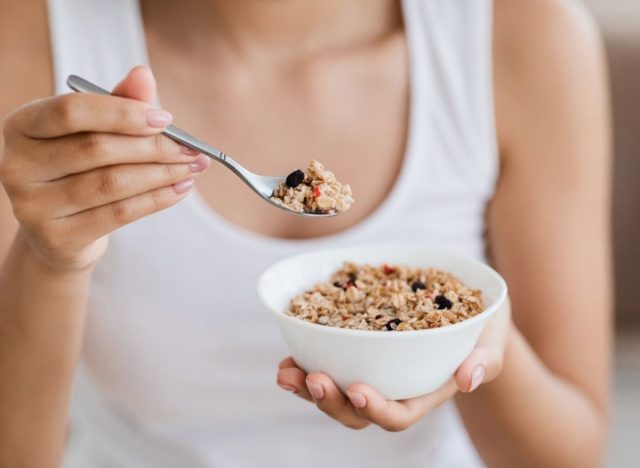Kicking off your morning with a warm bowl of oats is always a comforting and delicious experience. Oatmeal is just one of those foods that’s loved and recommended by dietitians as a healthy addition to one’s diet. But can eating too much oatmeal make you gain weight? We spoke with Amy Goodson, MS, RD, CSSD, LD, a registered dietitian and certified specialist in sports dietetics who sits on our Medical Expert Board, who shares everything you need to know about eating oatmeal for weight loss, along with how much may be too much for your waistline. Keep reading to learn more, and when you’re done, check out the 9 Best Low-Calorie Breakfasts for Weight Loss.
Can eating oatmeal help you lose weight?


Oatmeal can support your weight-loss efforts in a few ways. “First, it is rich in fiber, which helps you feel fuller for longer periods, potentially helping reduce overall calorie intake,” explains Goodson. “Second, oatmeal is a low-glycemic-index food, meaning it causes a slower rise in blood sugar levels compared to high-glycemic-index foods. This helps prevent spikes and crashes in energy levels, leading to better appetite control. Finally, oatmeal is a good source of complex carbohydrates, providing sustained energy without causing rapid spikes in insulin levels, which can contribute to fat storage.”
Can eating oatmeal make you gain weight?


Even though oatmeal is a beneficial, nutrient-packed addition to your diet, too much of anything is never a good thing. Goodson points out that the food itself won’t make you gain weight, but rather, extra calories will, no matter if those calories are coming from oatmeal, eggs, or a donut.
“While oatmeal itself is a healthy food choice, consuming it in excessive amounts or adding calorie-dense toppings can contribute to weight gain,” Goodson shares. “Oatmeal is relatively low in calories, but if you add too many high-calorie toppings like sugar, honey, nuts, or dried fruits, which are all dense in calories, the calorie content can increase significantly. It’s important to be mindful of portion sizes and choose toppings wisely to avoid overconsumption of calories.”
For instance, if you include one tablespoon of honey, one tablespoon of chia seeds, two tablespoons of chopped nuts, and two tablespoons of raisins in your oats, your calorie count is close to 300+ in just toppings alone. This can easily amount to excess calories, and if you consume a greater amount of calories than you need to maintain your weight, this can result in putting on extra pounds.
How should you eat oatmeal for weight loss?


To make sure your morning bowl of oats is optimized for weight loss, select nutritious toppings and practice portion control. “Aim for a serving size of around ½ to 1 cup of cooked oats,” Goodson suggests. “Instead of adding refined sugars or calorie-dense toppings, opt for fresh fruits like berries or sliced bananas, which add natural sweetness and additional fiber without excess calories. Other healthy toppings include a sprinkle of nuts or seeds for added protein and healthy fats, with sprinkle being the keyword, as well as a dash of cinnamon or vanilla extract for flavor without extra calories.”
Alexa Mellardo

